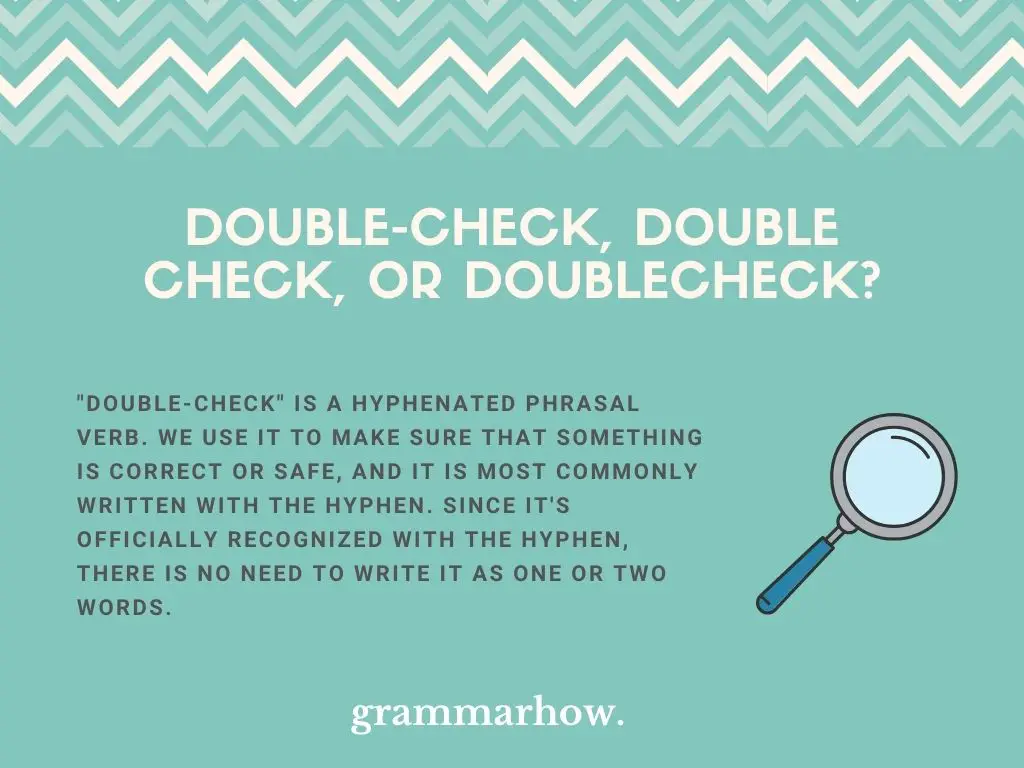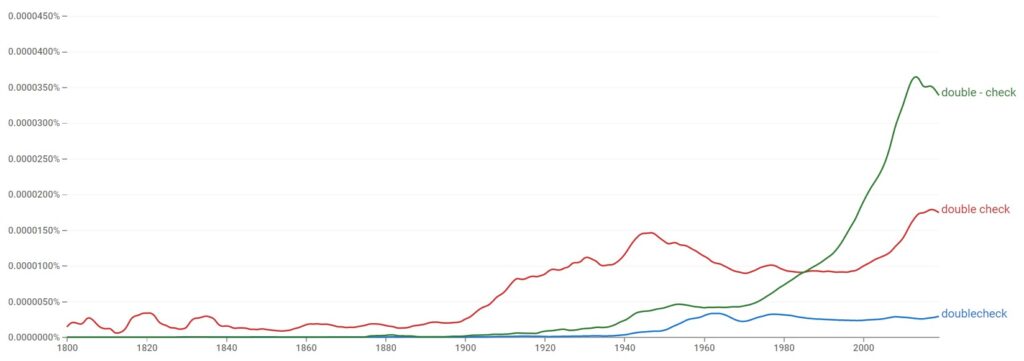“Double-checking” is an important thing to do in many practices. If we can make sure something is correct before final submission, we guarantee success. However, it would help to know whether it’s a hyphenated word or split into one or two words.
Double check vs. Double-check vs. Doublecheck
“Double-check” is a hyphenated phrasal verb. We use it to make sure that something is correct or safe, and it is most commonly written with the hyphen. Since it’s officially recognized with the hyphen, there is no need to write it as one or two words.

According to Google Ngram Viewer, “double-check” is by far the most popular choice of the three listed options. We use it as a hyphenated form because that’s common practice in English. You should make sure to follow these simple rules when you want to get it right.

In The Cambridge Dictionary and the Oxford Dictionary, “double-check” is also listed with the hyphen. It is written as a phrasal verb and teaches us about the meaning. However, there is no mention of using it without the hyphen in either dictionary.
Usually, when dictionaries provide definitions with hyphens, we can make more sense of the word. Since both dictionaries chose to include the hyphen, that shows it’s officially recognized as part of the word and should not be dropped.
Is “Doublecheck” One Word?
You should never write “doublecheck” as one word. It is not correct, and it completely removes the point of utilizing the hyphen in your writing. It is also fairly difficult to read when you try to group the words like this, which could be problematic for your readers.
Here are some examples to help you understand what we mean:
- Correct: Could you double-check the dinner reservation for tonight, Martin?
- Incorrect: I need you to doublecheck my spelling because I’m sure I made a mistake.
- Correct: Would you just double-check that I did this right? It’s supposed to be handed in today.
- Incorrect: I haven’t managed to doublecheck it just yet, but I will in a second!
“Doublecheck” is marked as incorrect, and you might be able to tell why. It’s difficult to read the two words “double” and “check” when they’re combined in this way, which is why it’s not good practice.
Is “Double check” Two Words?
Typically, you should not write “double check” as two words. Some native writers choose to because they think that removing the hyphen aids simplicity in their writing. However, since the hyphen is officially accepted in the spelling, it should be kept.
As English evolves, common trends do tend to appear. Since the hyphen seems to be a more old-fashioned concept in English, it might not be long before “double check” does become a simple combination of two words.
For the time being, though, you should stick to the hyphenated form.
Just to reiterate, you can refer to these examples:
- Correct: I have double-checked it over and over again. It’s complete!
- Incorrect: I need to double check it; otherwise, the boss will have my hide.
- Correct: He didn’t double-check it as we asked him to!
- Incorrect: Your double checking needs work, my friend. I can teach you.
Is “Double-check” Hyphenated?
“Double-check” is a hyphenated verb. We use it with the hyphen because it’s acceptable and recognized in all well-known English dictionaries. There is no need to deter from the norm on this one since everyone understands that the hyphen combines the words.
We can use the hyphen to group two words that often don’t share the same meaning. For instance, “double” and “check” do not have similar meanings, but combining them creates a new meaning that every English speaker understands.
You can check these examples out to help you:
- I think you should double-check this, sir. I don’t think it’s right.
- We double-checked the data per your request, and we saw nothing wrong with it.
- Can you double-check it? I don’t believe that it’s finished.
- I think it’s time to double-check what we did!
Is “Check” Capitalized In The Word “Double-Check”?
“Double-check” is not a proper noun. There is no need to capitalize either part of it, so we do not worry about capitalizing “check.” However, if you include it in a title, you might want to capitalize both words in the hyphen rather than just the first one.

Martin holds a Master’s degree in Finance and International Business. He has six years of experience in professional communication with clients, executives, and colleagues. Furthermore, he has teaching experience from Aarhus University. Martin has been featured as an expert in communication and teaching on Forbes and Shopify. Read more about Martin here.
